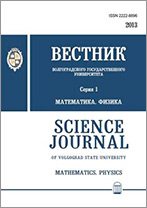|
This article is cited in 1 scientific paper (total in 1 paper)
Mathematics
On approximation of Stepanov's almost periodic functions by means of Marcinkiewicz
Yu. Kh. Khasanova, E. Safarzodab
a Institute of Mathematics, Academy of Sciences of Republic of Tajikistan, Dushanbe
b S. Aini Tajik State Pedagogical University
Abstract:
We study some questions of approximation of Stepanovs almost-periodic functions of
partial Fourier sums and means of Marcinkiewicz, when the Fourier exponents of functions under consideration have a limit point in infinity.
Let $S_p$ ($p\geq1$) denote the class of Stepanovs almost-periodic functions, whose Fourier exponents take the following form:
$$
\lambda_0=0,\,\,\,\lambda_{-n}=-\lambda_n,\,\,\,\lim_{n\rightarrow\infty}\lambda_n=\infty,\,\,\,
\lambda_n<\lambda_{n+1}\,\,\,(n=1,2,\ldots).
$$
Consider the Fourier series for a functions $f(x)\in S_p$
$$
f(x)\sim\sum\limits_{n = -\infty}^\infty A_n e^{i\lambda_nx},
$$
where
$$
A_n=\lim_{T\rightarrow\infty}\frac{1}{2T}\int_{-T}^Tf(x)e^{-i\lambda_nx}dx
$$
are Fourier coefficients of the function $f(x)\in S_p$ and
$$
S_\sigma(f;x)=\sum_{|\lambda_n|\leq\sigma}A_n e^{i\lambda_nx}\,\,\,(\sigma>0)
$$
is a partial sum of Fourier series.
Let $\Phi_\sigma(t)$ is an arbitrary real continuous even function such that
$$
1) \Phi_{\sigma}(0)=1; \,\,\,2) \Phi_{\sigma}(t)=0\,\,\,(|t|\leq\sigma).
$$
We set
$$
U_{\sigma}(f;\varphi;x)=\sum_{|\lambda_{m}|\leq\sigma}A_m\Phi_{\sigma}(\lambda_{m})e^{i\lambda_{m}x}.
$$
Let $S_p(R)$ stand for the space of bounded functions $f(x)\in S_p \,\,\,(p\geq 1)$ with the norm
$$
\|f(x)\|_{S_p}=\sup_{-\infty<x<\infty}\left\{\frac{1}{l}\int_x^{x+l}|f(x)|^p dx\right\}^{\frac{1}{p}}.
$$
Consider the value
$$
R(f;x)=\left\|U_{\sigma}(f;\varphi;x)-f(x)\right\|_{S_p},
$$
where
$$
U_{\sigma}(f;\varphi;x)=\int_{-\infty}^{\infty} f(x+t)
\Phi_{\sigma}(t)dt,
$$
$$
\Phi_{\sigma}(t)=\frac{1}{2\pi}\int_{0}^{\infty}\varphi_{\sigma}(u)K_{u}(t)du,\,\,\,
K_{u}(t)=2\frac{\sin(ut)}{t},
$$
$\varphi_{\sigma}(u)$ is some even function absolutely integrable on the interval $(0;\infty)$ with each fixed $\sigma>0$.
Theorem. If $f(x)\in S_p$, where Fourier exponents have no limit points at a finite distance, i.e. $\lambda_n\rightarrow\infty$, then the following bound is valid
$$
R(f;\varphi_{\sigma,a})\leq M\frac{\sigma+a}{\sigma-a}E_{\Lambda}(f)_{S_p},
$$
and
$$
\left\|f(x)-\frac{1}{n+1}\sum_{k=0}^{n}S_{k}(f;x)\right\|_{S_p}\leq\frac{M}{n+1}\sum_{k=0}^{n}E_{k}(f)_{S_p},
$$
where
$M$—constant and
$$
E_{\Lambda}(f)_{S_p}=\inf_{A_m}\left\|f(x)-\sum_{|\lambda_{m}|\leq\Lambda}A_m e^{i\lambda_{m}x}\right\|_{S_p}.
$$
Keywords:
Stepanovs almost periodic functions, Fourier series, Fourier exponents, limiting point in infinity, means of Marcinkievicz, trigonometric polynomial, best approximation.
Citation:
Yu. Kh. Khasanov, E. Safarzoda, “On approximation of Stepanov's almost periodic functions by means of Marcinkiewicz”, Vestnik Volgogradskogo gosudarstvennogo universiteta. Seriya 1. Mathematica. Physica, 2016, no. 6(37), 61–69
Linking options:
https://www.mathnet.ru/eng/vvgum146 https://www.mathnet.ru/eng/vvgum/y2016/i6/p61
|

|




 Contact us:
Contact us: Terms of Use
Terms of Use
 Registration to the website
Registration to the website Logotypes
Logotypes








 Citation in format
Citation in format 
